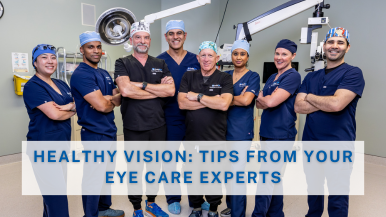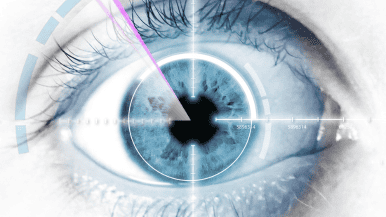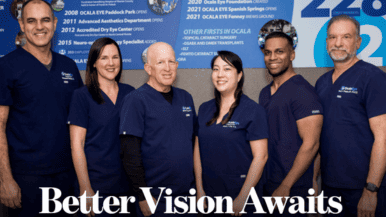- What is a cataract?
- What is cataract surgery?
- What is recovery like after cataract surgery?
- What will my vision be like after cataract surgery?
Beth G. has been a patient at Ocala Eye for longer than she “cares to talk about.” She’s had many routine treatments over the years to keep her eyes in top form, but she describes her cataract surgery as the “most notable.”
And she’s not alone. Cataracts are a leading cause of blindness in the United States. About one-half of the population will develop cataracts by the time they are 75 years old. Fortunately, cataract surgery is a safe way to remove the cataract so you can regain your vision and resume life.
What Is a Cataract?
Cataracts occur when the normally clear lens of your eye begins to cloud up, creating a milky whiteness that can limit or blur your vision. If left untreated, a cataract can eventually lead to vision loss. Patients like Beth often begin developing cataracts around age 40, but symptoms become much more prevalent at age 60 or older. It’s rare, but sometimes infants are even born with this type of eye disorder.
The symptoms of cataracts can include:
- Changes in how you see color
- Double vision
- Foggy or cloudy vision
- Prescription changes in your eyeglasses, particularly a sudden onset of nearsightedness
- Reduced vision
- Sensitivity to bright lights or glare
Cataracts aren’t painful, and they are a very common part of the aging process. Your eyes are made up primarily of water and proteins. The proteins break down as your eyes age, which makes the clear lenses at the front of your eye cloudy. This can happen in just one eye or in both.
However, some lifestyle choices can increase the risk that you develop cataracts, including:
- Heavy alcohol use
- Living in a location with severe air pollution
- Smoking
Chronic illnesses, like diabetes, can make cataracts worsen quickly. Steroids to treat arthritis and other types of medications can speed cataract formation. Even spending too much time in the sun without sunglasses can lead to cataracts.
There is also a genetic component to cataracts so if your parents developed cataracts in their later years, you may, as well.
Over time, if you develop cataracts, your daily life can be affected. Some activities could become much more challenging, such as:
- Climbing stairs
- Driving
- Reading or watching TV
- Working
If you have mild cataracts your eye doctor may just increase the strength of your eyeglass prescription. However, if your cataracts worsen, as often is the case as you age, your doctor may recommend cataract surgery.
What Is Cataract Surgery?
Cataract surgery is an in-office ophthalmologic surgical procedure to remove the milky lens and replace it with a clear lens. The clear lens is an artificial implant called an intraocular lens (IOL) custom-designed to fit your eye. The IOL bends the light that enters your eye to improve the clarity of your vision.
Cataract surgery is done with a local anesthesia, so you’ll be awake but won’t feel the procedure. Cataract surgery can usually be performed in an hour or less. If you have cataracts in both eyes, your doctor may recommend two separate surgeries a few weeks apart.
Before the cataract surgery, your doctor will conduct a thorough eye exam to check the health of your eyes and perform vision tests and eye measurements. You’ll be prepped for what the surgery will entail as well as the after-care and recovery.
Here’s what you’ll typically experience during cataract surgery:
- The doctor will place eye drops in the eye to dilate your pupil
- You’ll receive a local anesthetic to numb the area
- You may be given a sedative to relax you
- During the surgery, your doctor will make a tiny incision in the cornea
- Through this flap, the lens of your eye will carefully be removed
- Your surgeon will place the custom lens in your eye
- The flap will be closed and the incision will heal without stitches
- A protective shield will be placed over the eye to protect the area
You’ll go home the same day to recover, although someone will have to drive you there.
What Is Recovery Like After Cataract Surgery?
Your eyes will heal about eight weeks after cataract surgery, but you can resume many of your normal tasks a day or so after the procedure. However, you will be encouraged to follow the following limitations for a few weeks:
- Avoid bending over, which puts pressure on your eyes
- Do not touch or rub your eyes
- Do not drive
- Do not lift heavy objects or engage in strenuous exercise
You’ll leave the surgical center with a special pair of sunglasses designed to protect your eyes after the surgery. You’ll also wear an eye shield at night when you sleep to make sure you don’t rub your eyes unconsciously. Additionally, your doctor will provide you with some special eye drops to lubricate your eyes regularly. You’ll also have several checkups with your doctor during the healing process to ensure your eyes heal well.
What Will My Vision Be Like After Cataract Surgery?
 During the healing process, your eyes may feel sore or itchy. Bright light may irritate your eyes and you may have some tearing. For a few days after cataract surgery, your vision may be blurry. However, your vision should improve within the first few weeks.
During the healing process, your eyes may feel sore or itchy. Bright light may irritate your eyes and you may have some tearing. For a few days after cataract surgery, your vision may be blurry. However, your vision should improve within the first few weeks.
Approximately 90% of cataract surgery patients see better after the procedure. However, you still may need corrective glasses or contacts. If you’ve had LASIK, you may need to repeat the procedure. Every person is different, which is why you’ll work closely with the team at Ocala Eye to ensure a successful surgery, recovery, and the resumption of normal activities.
Beth experienced successful cataract surgery with Ocala Eye and feels great. She says she appreciates Ocala Eye because they are, “kind and caring and they do an awesome job.” If you’re worried about the health of your eyes or think you may have developed a cataract, please don’t hesitate to contact us for a consultation.




